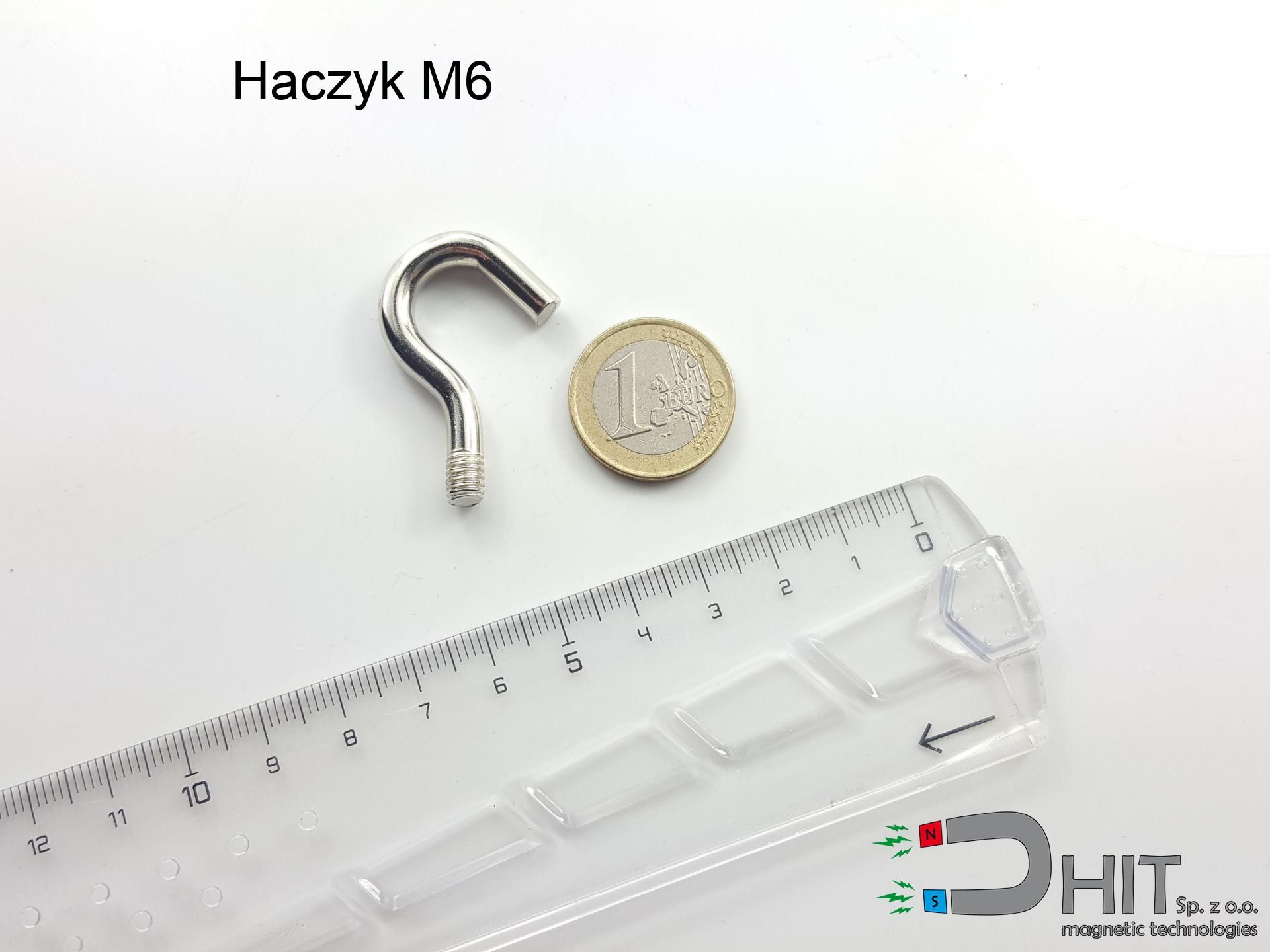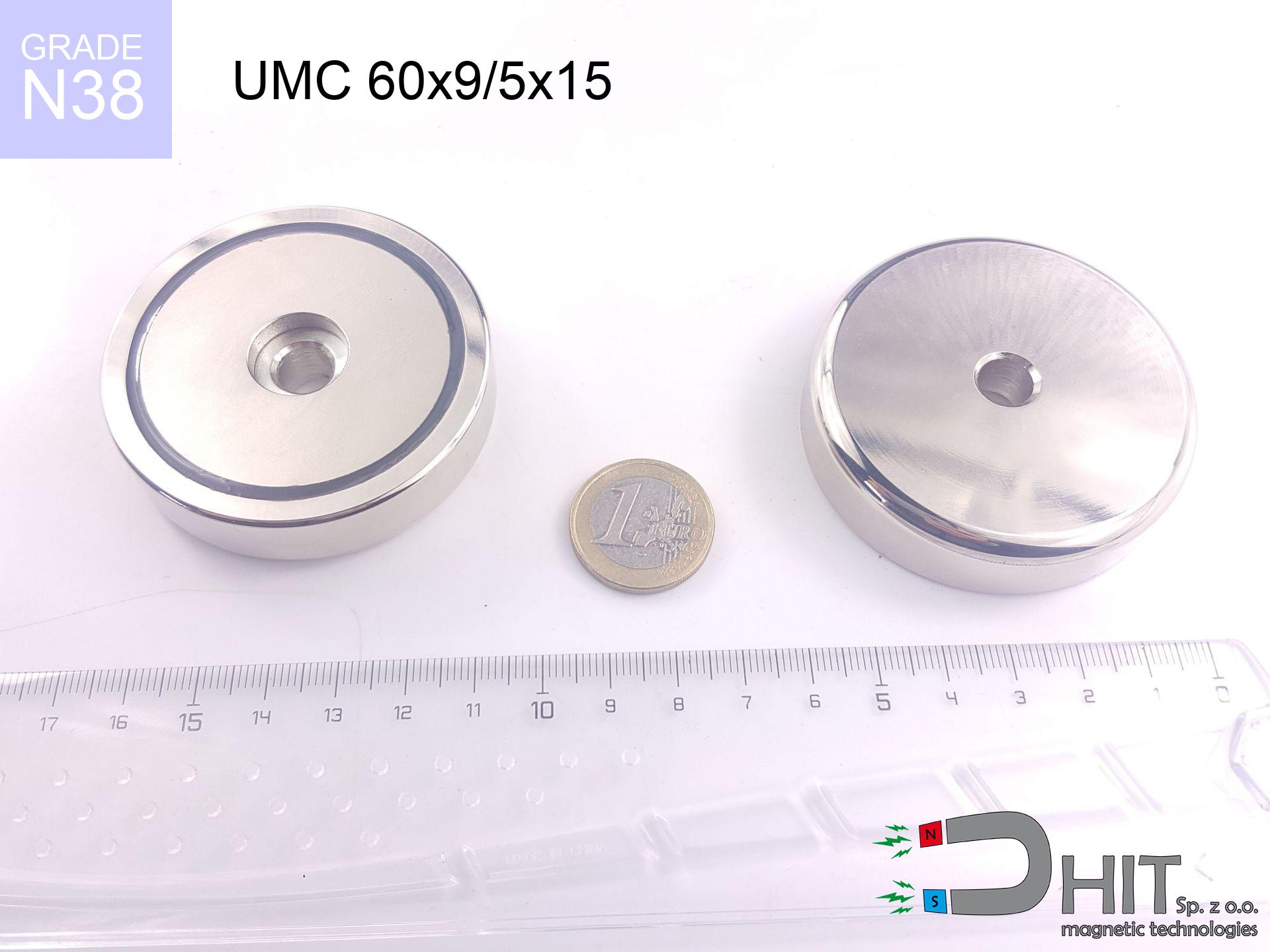AM Haczyk M6 - magnetic accessories
magnetic accessories
Catalog no 080507
Coating
[NiCuNi] Nickel
1.230 ZŁ with VAT / pcs + price for transport
1.000 ZŁ net + 23% VAT / pcs
bulk discounts:
Need more?
Give us a call
+48 888 99 98 98
alternatively contact us using
inquiry form
the contact page.
Weight as well as appearance of a magnet can be calculated with our
power calculator.
Same-day processing for orders placed before 14:00.
Technical specification of the product - AM Haczyk M6 - magnetic accessories
Specification / characteristics - AM Haczyk M6 - magnetic accessories
| properties | values |
|---|---|
| Cat. no. | 080507 |
| Production/Distribution | Dhit sp. z o.o. |
| Country of origin | Poland / China / Germany |
| Customs code | 85059029 |
| Coating | [NiCuNi] Nickel |
| Manufacturing Tolerance | ±1 mm |
Physical properties of sintered neodymium magnets Nd2Fe14B at 20°C
| properties | values | units |
|---|---|---|
| Vickers hardness | ≥550 | Hv |
| Density | ≥7.4 | g/cm3 |
| Curie Temperature TC | 312 - 380 | °C |
| Curie Temperature TF | 593 - 716 | °F |
| Specific resistance | 150 | μΩ⋅cm |
| Bending strength | 250 | MPa |
| Compressive strength | 1000~1100 | MPa |
| Thermal expansion parallel (∥) to orientation (M) | (3-4) x 10-6 | °C-1 |
| Thermal expansion perpendicular (⊥) to orientation (M) | -(1-3) x 10-6 | °C-1 |
| Young's modulus | 1.7 x 104 | kg/mm² |
Material specification
| iron (Fe) | 64% – 68% |
| neodymium (Nd) | 29% – 32% |
| boron (B) | 1.1% – 1.2% |
| dysprosium (Dy) | 0.5% – 2.0% |
| coating (Ni-Cu-Ni) | < 0.05% |
Sustainability
| recyclability (EoL) | 100% |
| recycled raw materials | ~10% (pre-cons) |
| carbon footprint | low / zredukowany |
| waste code (EWC) | 16 02 16 |
View also proposals
Strengths as well as weaknesses of Nd2Fe14B magnets.
Pros
- Their magnetic field is durable, and after around ten years it drops only by ~1% (theoretically),
- Magnets perfectly protect themselves against loss of magnetization caused by external fields,
- By using a lustrous coating of gold, the element gains an nice look,
- The surface of neodymium magnets generates a powerful magnetic field – this is one of their assets,
- Through (adequate) combination of ingredients, they can achieve high thermal resistance, enabling operation at temperatures approaching 230°C and above...
- Possibility of detailed forming as well as optimizing to complex requirements,
- Versatile presence in advanced technology sectors – they serve a role in HDD drives, motor assemblies, advanced medical instruments, as well as technologically advanced constructions.
- Relatively small size with high pulling force – neodymium magnets offer impressive pulling force in compact dimensions, which allows their use in compact constructions
Cons
- Susceptibility to cracking is one of their disadvantages. Upon strong impact they can break. We advise keeping them in a special holder, which not only secures them against impacts but also raises their durability
- When exposed to high temperature, neodymium magnets suffer a drop in strength. Often, when the temperature exceeds 80°C, their strength decreases (depending on the size, as well as shape of the magnet). For those who need magnets for extreme conditions, we offer [AH] versions withstanding up to 230°C
- Magnets exposed to a humid environment can rust. Therefore while using outdoors, we suggest using waterproof magnets made of rubber, plastic or other material resistant to moisture
- Limited ability of making nuts in the magnet and complex forms - preferred is a housing - magnetic holder.
- Possible danger to health – tiny shards of magnets are risky, if swallowed, which becomes key in the context of child health protection. It is also worth noting that small components of these magnets are able to disrupt the diagnostic process medical in case of swallowing.
- Higher cost of purchase is a significant factor to consider compared to ceramic magnets, especially in budget applications
Lifting parameters
Maximum magnetic pulling force – what it depends on?
- using a sheet made of low-carbon steel, serving as a circuit closing element
- possessing a thickness of minimum 10 mm to ensure full flux closure
- with a surface cleaned and smooth
- under conditions of no distance (metal-to-metal)
- under axial force direction (90-degree angle)
- at room temperature
Lifting capacity in practice – influencing factors
- Clearance – existence of foreign body (rust, tape, gap) acts as an insulator, which lowers power steeply (even by 50% at 0.5 mm).
- Load vector – maximum parameter is available only during pulling at a 90° angle. The shear force of the magnet along the surface is typically many times smaller (approx. 1/5 of the lifting capacity).
- Metal thickness – the thinner the sheet, the weaker the hold. Magnetic flux passes through the material instead of converting into lifting capacity.
- Plate material – mild steel attracts best. Alloy admixtures reduce magnetic properties and holding force.
- Surface structure – the smoother and more polished the plate, the better the adhesion and higher the lifting capacity. Unevenness creates an air distance.
- Thermal factor – high temperature reduces pulling force. Exceeding the limit temperature can permanently damage the magnet.
Lifting capacity testing was carried out on plates with a smooth surface of optimal thickness, under perpendicular forces, in contrast under parallel forces the load capacity is reduced by as much as fivefold. Additionally, even a slight gap between the magnet and the plate decreases the load capacity.
Safety rules for work with NdFeB magnets
Shattering risk
NdFeB magnets are sintered ceramics, meaning they are very brittle. Collision of two magnets leads to them breaking into small pieces.
Skin irritation risks
Medical facts indicate that the nickel plating (standard magnet coating) is a common allergen. If your skin reacts to metals, avoid touching magnets with bare hands or opt for encased magnets.
Keep away from electronics
GPS units and smartphones are highly susceptible to magnetic fields. Close proximity with a strong magnet can permanently damage the sensors in your phone.
Dust is flammable
Fire hazard: Rare earth powder is highly flammable. Do not process magnets in home conditions as this may cause fire.
Immense force
Handle magnets with awareness. Their powerful strength can surprise even professionals. Be vigilant and respect their power.
Life threat
Individuals with a heart stimulator should keep an large gap from magnets. The magnetic field can stop the operation of the implant.
Permanent damage
Standard neodymium magnets (grade N) lose power when the temperature goes above 80°C. Damage is permanent.
Do not give to children
Product intended for adults. Tiny parts pose a choking risk, leading to intestinal necrosis. Store out of reach of kids and pets.
Bone fractures
Big blocks can crush fingers in a fraction of a second. Never place your hand between two strong magnets.
Electronic devices
Do not bring magnets near a purse, computer, or TV. The magnetism can irreversibly ruin these devices and erase data from cards.





![SM 19x225 [2xM6] / N50 - magnetic separator SM 19x225 [2xM6] / N50 - magnetic separator](https://cdn3.dhit.pl/graphics/products/sm-19x225-2xm6-jis.jpg)


